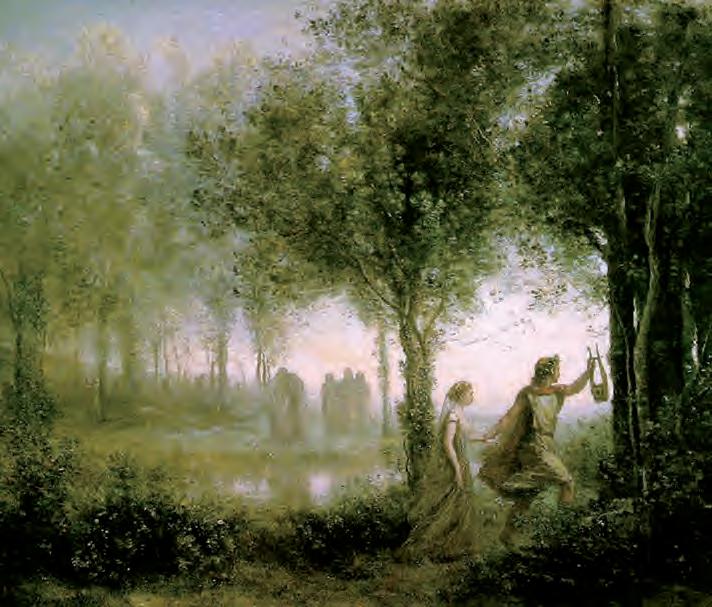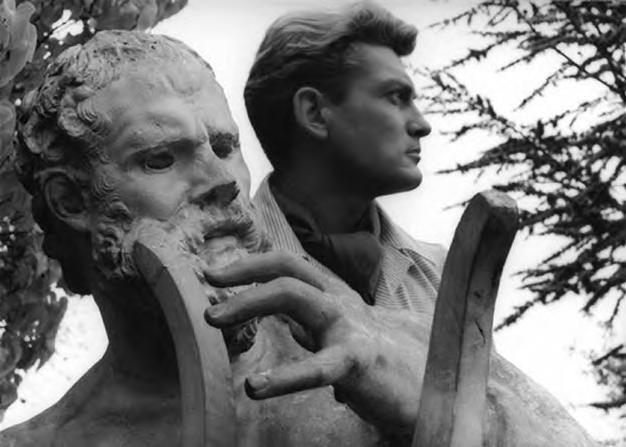
10 minute read
orpheus and eurydice
the drama of
the impossible love
Advertisement
The story of Orpheus and Eurydice, which can be interpreted in many ways, has inspired a number of composers – Monteverdi, Gluck and Offenbach – to put to music what is sometimes called the drama of the impossible love. This was not without reason: there is, after all, no form of art that approaches the spirit of the divine love (Orpheus) so well as music. Similar to the Spirit, music is lled with delight and ecstasy, but simultaneously, it is eeting and elusive. Just as the Spirit, music has no past or future, but it comes to life, into action, in the actual now. And similar to a spiritual touch, sparks of divine re may leap over in music.
ORPHEUS AND EURYDICE
THE LEGEND ‘One day, Apollo, son of Zeus, saw that people on earth indulged in a sinful and wicked life and in all kinds of excesses. He saw that, although people had accepted God as a higher goal in their lives, this was no longer put into practice. He, Apollo, the god of the Light, eternal youth, the muses and medicine, decided to help humanity. He poured his spirit into a priestess who was devoted to him, called Calliope. Calliope, also the muse of poetry and eloquence, gave birth to a son whom she called Orpheus. This name of a Phoenician origin means: he who heals with Light (aour = light and rophae = healing). And to honour him, he received famous nicknames like: the melli uous saviour of people, the thrice-crowned one: in heaven, on earth and in Hades. At a young age, Apollo gave Orpheus a sevenstringed lyre and the muses, his aunts, taught him to play and sing. Each string of this lyre represented one-seventh part of the harmony of the whole of creation, and each time that Orpheus elicited sounds from the strings, the whole of creation radiated with his Light. When Orpheus had reached adulthood, he left his mother and her sisters, the other eight muses, to bring the divine music to the earth, The voice and string music of this son of the Light were so pure, so exalted, so simple, that, as the story relates, warriors put down their weapons, wild animals lay down at his feet, enchanted, trees pulled up their roots from the soil to be able to be closer, indeed, even the rocks were set in motion and moved towards the heavenly singer.’
DIVINE INFLUENCE This image shows what happens if ordinary nature is a ected by a living, vibrating power from the original Supernature with its pure energies of a much higher vibration. To be able to understand the myth of Orpheus properly, we would best take the view of man of the ancient Greeks as our point of departure. This view of man is strongly permeated by the wisdom of the ancient mysteries, which represents the human being as a fundamentally twofold being. On the one hand, we see the human being of this nature, the restless human being, full of animal-like, but also more exalted inclinations, always seeking rest and balance in a world that is continuously in motion and in which ultimately no rest and balance can be found whatsoever. After all, the human eld of life is wholly controlled by opposites: day-night,
light-darkness, love-hatred, life-death. This rhythm makes the human being live, but he who practises self-maintenance, man, clings to one of the poles of these opposites: he wants health, not illness; he wants abundance, not need; he wants life, not death, and he wants love without hatred. However, the law of the two poles, dialectics, that turns everything in life into its opposite is unrelenting: nothing is permanent! On the other hand, there is a divine principle in the human being that can unfold to the extent that a human being of this nature is prepared for it and admits it. On the one hand, this divine principle grants the human being insight into the tragedy of earthly existence and on the other, it awakens a longing, a mighty homesickness for another life that is free, pure and exalted. The mystery schools
Orpheus’ love has no other purpose than to guide Eurydice through the gates of the second death, to the life of the Spirit

of all times admitted and still admit people, who were able to experience the divine in uence on their soul. Dissociated from their I and the dominance of animal nature, a new ensoulment developed, inspired by and lled with exalted, divine knowledge. The link with the Spirit that has existed from the outset will, ultimately, wholly ful l this human being.
The myth of Orpheus shows how from time to time impulses emanate from the original, divine eld of life that try to vivify the latent, spiritual possibilities in the human being. Although the pure, spiritual principle is often deeply buried in a heart that is overgrown by everything that natural, lower life evokes in it, there always seems to be something that still smoulders, vibrates and reacts to Orpheus’ call. Through his music, even someone who strongly clings to his earthly possessions will, as in a ash of consciousness, see that a wholly di erent life is possible, a life without fear, worry and anxiety, free from the meaningless drudgery in the transient world.
INNER REST Orpheus’ music lifts a human being above the everyday level of life with its continuous struggle for life. In other words, the human being lays down his weapons. He ceases struggling in a world that is, after all, controlled by the law of the jungle and of ‘eating or being eaten’. His passions and urges no longer play a dominant role now. The nervous tension in the brain and spinal system (the tree of life in the human system) subsides in the vibration eld of the heavenly music. The hardened forms of expression of the I-human being, the rocks, are set in motion, weigh less heavily upon him, and form less of an impediment to him. However, Orpheus’ music is exclusively meant for the divine principle in a human being. For the human being who does not have any higher aspirations and is wholly content with the ful lment of his primary desires and needs, the vibrations of these sounds are therefore inaudible and elusive. Yet, the rst reaction of a human being, who is inwardly touched by the divine call, is to link himself with Orpheus’ music and to make lower nature share in it. Let us now consider the myth from the other side, from the point of view of the nymph Eurydice. Eurydice is the human soul who, enabled by her openness, reacts, indeed must react to Orpheus’ call. However, she still has insu cient consciousness of what the music actually demands of her. In a rst re ex, Eurydice therefore tries to seize the joy that the divine touch causes in her innermost being and to emanate it into the world around her. And seemingly, she succeeds in linking herself with this harmony, peace and joy of life and spreads it around her. In the myth, this is represented as the impos-
Orpheus leads Eurydice away from Hades (Orphée ramenant Eurydice des enfers) Jean-Baptiste Camille
Corot, 1861. Houston: Museum of ne arts, Texas, VS.
sible marriage between Orpheus and Eurydice. After all, the divine and the earthly world are elds of life that fundamentally di er and that cannot be combined. This is why the story tells that the marriage between Orpheus and Eurydice was accompanied by a bad omen: the torches that were to illuminate the wedding hall did not light up, because they were damp and the smoke blinded Hymen, the god of marriage, when he spoke the wedding blessing. And indeed, at the moment that Eurydice began to believe that she would be able to stop the turning of the wheel of dialectics with the help of Orpheus’ music, and that happiness, harmony and peace would no longer turn into unhappiness and disharmony, she was cruelly pushed out of her sham paradise. When she, drunk with happiness, danced in a forest meadow to Orpheus’ music, she unsuspectingly stepped on a snake that bit her heel, upon which she fell dead to the ground. Orpheus’ grief was immense, not because Eurydice had been seized by death, but rather because the divine element in her soul had not yet developed su ciently. She had not yet bid a de nitive farewell to the world of opposites and, blinded by her earth-bound consciousness, she had not yet been able to break through the veils of the mysteries and enter the ascending path. However, Orpheus’ love had been linked with the unassailable, spiritual centre in Eurydice’s soul – and thus he began to seek her in Hades, in the underworld. To the Greeks, it was selfevident that death was not the end of earthly existence. They knew that the soul, that is, the complex of urges, passions and patterns of thinking built up during the earthly life, continued living for some time, after having discarded the physical garment, in a eld of life of an etheric nature that was invisible to the senses of the earthly world. However, life there, after death, was only a re ex of the past life. It does not have new possibilities of development, and is ultimately extinguished. In Greek mythology, the earthbound souls therefore lead a broken, bloodless and increasingly shadowy life.
THE SECOND DEATH The Rosicrucians, too, speak of a world that consists of a visible part and its invisible counterpart (Hades means: he who does not see) that is just as transient as the invisible part. And in between, the neverending wheel of birth and death turns until the highest aspects in the human being are su ciently strong to guide him into the elds of life of Apollo, the solar world, the actual realm of life of our humanity. In the universal teachings, and certainly also in the Orphic mysteries, the candidate on the path of liberation had, therefore, to die twice: the rst death concerned the ordinary, familiar death of discarding the physical garment, as a result of old age, illness or violence. This death is sometimes called the incidental death because, in itself, this death does not dissociate the human being from the dialectical eld of life.

In 1949, Jean Cocteau (1889-1963) created a controversial movie ‘Orfée’ (Orpheus), with the heartbreaker of that time, Jean Marais (1913-1998) in the leading role.
After all, until a human being bids a radical farewell to his lower nature, he continues passing through the cycle from birth to death and from death to birth again. The second death, the structural death, concerns dissociating from and removing everything that time and again drives a human being to birth. We may interpret this as the whole complex of desires, urges, lusts and inclinations that time and again seduce the human being into eternal repetition of the same: their grati cation. However, in this way, we will never be able to quench our thirst. Therefore, every candidate on the path of liberation attempts to put an end to this complex whole. The second death leads to rebirth in the world of immortal souls. After this digression, we will better be able to understand the myth of Orpheus. After all, Orpheus’ love has no other purpose than to guide Eurydice through the gates of the second death. This means that Eurydice, if she truly wants to become Orpheus’ bride, should liberate herself from the dominance of the nature of desires. In the next article, we will see how Orpheus, the activity of the Brotherhood, works in this respect.








